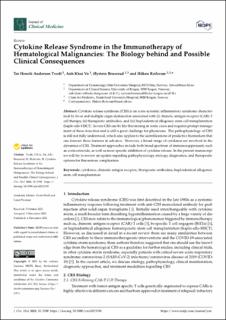Cytokine release syndrome in the immunotherapy of hematological malignancies: The biology behind and possible clinical consequences
Journal article, Peer reviewed
Published version

Åpne
Permanent lenke
https://hdl.handle.net/11250/2991652Utgivelsesdato
2021Metadata
Vis full innførselSamlinger
- Department of Clinical Science [2318]
- Registrations from Cristin [9791]
Sammendrag
Cytokine release syndrome (CRS) is an acute systemic inflammatory syndrome characterized by fever and multiple organ dysfunction associated with (i) chimeric antigen receptor (CAR)-T cell therapy, (ii) therapeutic antibodies, and (iii) haploidentical allogeneic stem cell transplantation (haplo-allo-HSCT). Severe CRS can be life-threatening in some cases and requires prompt management of those toxicities and is still a great challenge for physicians. The pathophysiology of CRS is still not fully understood, which also applies to the identifications of predictive biomarkers that can forecast these features in advance. However, a broad range of cytokines are involved in the dynamics of CRS. Treatment approaches include both broad spectrum of immunosuppressant, such as corticosteroids, as well as more specific inhibition of cytokine release. In the present manuscript we will try to review an update regarding pathophysiology, etiology, diagnostics, and therapeutic options for this serious complication.
